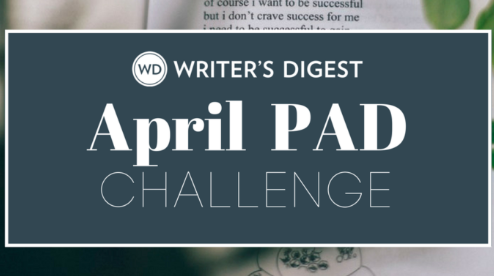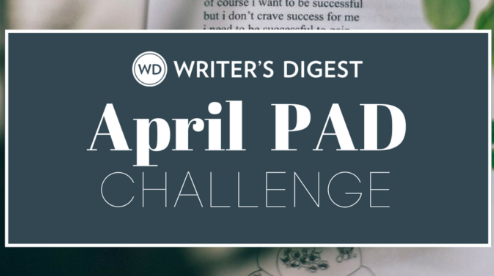Amorak Huey: On Stalling Out After Publication
Poet Amorak Huey hit a creative roadblock after publishing his latest poetry collection Dad Jokes From Late in the Patriarchy. He shares his cure (and more!) in this article.
Amorak Huey’s fourth book of poems is Dad Jokes from Late in the Patriarchy (Sundress Publications, 2021). Co-author with W. Todd Kaneko of the textbook Poetry: A Writer’s Guide and Anthology (Bloomsbury Academic, 2018) and the chapbook Slash / Slash (Diode Editions, 2021), Huey teaches writing at Grand Valley State University in Michigan. His work has appeared in The Best American Poetry, American Poetry Review, Columbia Review, The Southern Review, the Academy of American Poets’ Poem-A-Day, and many other print and online journals.
In this post, Huey explains how he hit a creative roadblock after publishing his latest poetry collection Dad Jokes From Late in the Patriarchy. He shares his cure (and more!) here.
****
Click to continue.
****
Name: Amorak Huey
Book title: Dad Jokes from Late in the Patriarchy
Publisher: Sundress Publications
Release date: May 15, 2021
Length: 120 pages (54 poems)
Previous titles by the author: Boom Box (Sundress, 2019), Seducing the Asparagus Queen (Cloudbank Books, 2018), and Ha Ha Ha Thump (Sundress, 2015)
IndieBound | Amazon
[WD uses affiliate links.]
How long did it take you to write this book?
The oldest poem in the book was written in 2012. The newest was written in summer 2020. Most of them were written between 2015 and 2017.
How did you go about getting it published?
I compiled the initial draft of the collection in the summer of 2017 and worked with brilliant poet and freelance editor Maggie Smith to get the draft ready to send out. After she helped me get it into shape, I started submitting the manuscript to contests and open-reading periods for poetry presses that publish books I admire. I was trying not to hurry the process, trying to be choosy about where I sent it. After two years and eight rejections, it was accepted by Sundress Publications during their 2019 open reading period. Sundress had published two of my first three books, so I knew they’d be a great home for this one, too.
How many of your poems were previously published?
All but three of the poems in the book have been published in literary journals.
Were there any surprises or learning moments in the publishing process for this title?
Not so much surprises, but reminders of how hard it is to get a book of poems published. I have been sending poetry manuscripts into the world since 2008. That’s a whole lot of rejections, and enough money in contest and reading fees to buy a decent used car. I am well aware of how lucky I am to be able to have spent this money in this way. I don’t have any answers, but our model for publishing poetry books is broken. The pay-to-play process enforces the status quo and is a barrier against those who cannot pay. It’s a problem. But I know there’s no simple solution. Publishing a book costs money, and it’s not like most poetry sells enough to recoup those costs. Still, the primary source of funding for books should not be poets whose manuscripts were rejected; that’s preying on people’s hopes.
Were there any surprises in the writing process for this book?
The surprise came after the book when my poetry writing seriously stalled in a way it hadn’t in years. I finally figured out that it was because I had seen the book as sort of a stopping place. Like, I’d been working toward it for so long, and then I finished it, and I didn’t know what to do next. It turned out that I wasn’t done writing poems about the things the book is about: fatherhood, masculinity, mortality. I had to grant myself permission to write more poems engaging these themes even if they wouldn’t go in this particular collection.
Did you revise any of your poems between acceptance and publication?
Yes, I did, though not to the extent I have with some of my previous collections. I made one pretty thorough editing pass on my own post-acceptance before working with my editor, Sundress’ Jeremy Michael Reed, to go through the whole collection. We made smallish changes here and there, adjusted a title or two, did some reordering, took out a couple of poems, and added a few newer pieces. One of the questions I often get from my students is how do you know when a poem is done, and the same question applies to a manuscript, and I don’t know, “done” is kind of a myth. A book is sort of like a photograph, a snapshot of the collection at a particular point in time, locked into physical form, but it doesn’t necessarily mean the poems are more or less finished than they were before that point, and if the print deadline had been, say, two months later, the book would be different.
Who or what are you currently reading?
Always reading Traci Brimhall, Layli Long Soldier, Jorie Graham. Just finished Hannah Vanderhart’s What Pecan Light and Kendra DeColo’s I Am Not Trying to Hide My Hungers from the World, and I’m re-reading Collier Nogues’ On the Other Side, Blue.
If you could share one piece of advice with other poets, what would it be?
My go-to advice has been, “Always be writing the next poem.” (A bit of advice I forgot when I finished the Dad Jokes manuscript.) I still think that’s useful, but, you know, we’re all dealing with a global pandemic, and so I’d add: “Give yourself a break. Making poems is not a race.”
Robert Lee Brewer is Senior Editor of Writer's Digest, which includes managing the content on WritersDigest.com and programming virtual conferences. He's the author of 40 Plot Twist Prompts for Writers: Writing Ideas for Bending Stories in New Directions, The Complete Guide of Poetic Forms: 100+ Poetic Form Definitions and Examples for Poets, Poem-a-Day: 365 Poetry Writing Prompts for a Year of Poeming, and more. Also, he's the editor of Writer's Market, Poet's Market, and Guide to Literary Agents. Follow him on Twitter @robertleebrewer.






